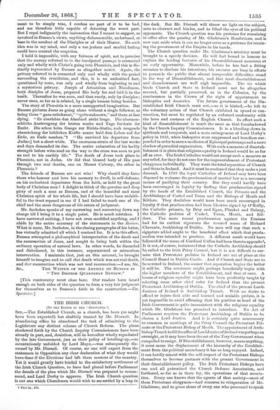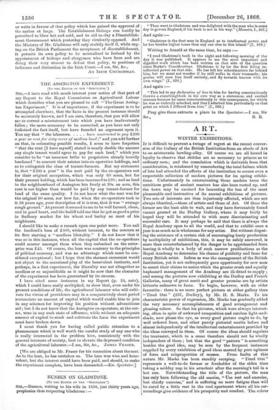THE IRISH CHURCH.
[TO THE Eprros OF THE "SPECTATOR."] SIR,—The Established Church, as a church, has been (as might have been expected) but shabbily treated by 11Ir. Disraeli. In abandoning office he abandoned the task of submitting to the Legislature any distinct scheme of Church Reform. The plans shadowed forth by the Church Inquiry Commissioners have been already in part, and, doubtless, will be hereafter wholly repudiated by the late Government, just as their policy of levelling-up,—so ostentatiously unfolded by Lord Mayo,—was subsequently dis- owned by Mr. Disraeli. Of course, no one will expect from the statesmen in Opposition any clear declaration of what they would have done if the Elections had left them masters of the country. Yet it would greatly have tended to the satisfactory settlement of the Irish Church Question, to have had placed before Parliament the details of the plan which Mr. Disraeli was prepared to recom- mend, and Lord Derby to approve. The Irish Church question is not one which Churchmen would wish to see settled by a leap in t Part ix., 475. the dark. But Mr. Disraeli will throw no light on the subject, save to obstruct and hinder, and to blind the eyes of his political opponents. The Church question was his pretence for remaining in office after the passing of Mr. Gladstone's Resolutions, and is now cast aside when it can no longer serve as a pretence for retain- ing the government of the Empire in his hands.
The Church question under Mr. Gladstone's ministry must be brought to a speedy decision. He will feel bound in honour to explain the leading features of his Disestablishment measures at an early opportunity. Meanwhile, before he has had a fitting occasion to disclose his intentions, his enemies are busy in efforts to persuade the public that almost insuperable difficulties stand in the way of Disestablishmeut, and that total disestablishment and disendowment are well nigh impossible. The tie which binds Church and State in Ireland must not be altoge.ther severed, but partially preserved, as in the Colonies, by the continuance in the Crown of the right of appointment to bishoprics and deaneries. The future government of the Dis- established Irish Church must not,—so it is hlifted, —be left to the voluntary action of that Church exhibited in synod or con- vocation, but must be regulated by an enforced conformity with the laws and customs of the English Church. Iu effect such a kind of disestablishment is much the same as that foreshadowed by the Church Inquiry Commissioners. It is a bleeding-down in spirituals and temporals, and a mere enlargement of Lord Derby's policy in 1833, when bishoprics were suppressed and benefices sus- pended in order to save a modicum of Episcopal patronage and a mere shadow of parochial organization. With such a measure of disestab- lishment it is plain that religious equality in Ireland would be as far off as ever. The Irish Catholics would not accept such a measure as any relief, for they do not care for the impoverishment of Protestant clergymen individually. They want the total separation of Church and State in Ireland. And it must be confessed that they make a just demand. In 1798 the loyal Catholics of Ireland may have been disposed to welcome the proclamation of martial law as a necessary means of pacifying their country. But they could hardly have been encouraged in loyalty by finding that proclamation signed by the heads of the Established Church, the Primate and the Archbishops of Cashel and Tuam and the Bishops of Meath and Kildare. They doubtless would have been much encouraged in loyalty if that proclamation had been likewise signed by O'Reilly, the Catholic primate, by Bray and Egan, Plunket and Delany, the Catholic prelates of Cashel, Thaw, Meath, and Kil- dare. The more recent proclamation against the Fenians had for its earliest signature the revered name of Richard Chevenix, Archbishop of Dublin. No man will say that such a signature added aught to the beneficial effect which that procla- mation was intended to produce. A different result would have followed if the name of Cardinal Cullen had been thereto appended. It is not, of course, insinuated that the Catholic Archbishop should be called to the Irish Privy Council, but it is not difficult to sur- mise that Protestant prelates in Ireland are out of place at the Council Board in Dublin Castle. And if Church and State are to be severed in Ireland, the sooner that separation begins the better it will be. The severance might perhaps beneficially begin with the higher members of the Establishment, and that at once. A lesson of religious equality might have been profitably taught by selecting some other chief ruler for Ireland than the present Protestant Archbishop of Dublin. The chief of the present Lords Justices of Ireland is Archbishop Trench. With no desire to offend or injure that able and learned and amiable prelate, it is yet impossible to avoid affirming that his pasition as head of the Irish Government is quite inconsistent with the religious equality which Mr. Gladstone has promised to introduce. No Act of Parliament requires the Protestant Archbishop of Dublin to be chosen a Lord Justice. And it is certainly quite unnecessary to summon to meetings of the Privy Council the Protestant Pri- mate or the Protestant Bishop of Meath. The appointment of Arch- bishop Trench to fill the office of Lord Justice of Ireland wasperhaps an oversight, or it may have been the act of the Tory Government when
compelled to resign. If Disestablishment, however, means anything, it must mean the displacement of the hierarchy of the Establish-
ment from the political ascendancy it has so long enjoyed. Indeed, it can hardly consist with the self-respect of the Protestant Bishops themselves to become partners with the present Government in their disestablishment policy. The Irish Protestant Bishops have one and all patronized the Church Defence Association, and
furthered, so far as in them lay, the operations of that associa- tion. Every one knows that the agents of that society—most of them Protestant clergymen—had recourse to vituperation of Mr. Gladstone, and to gross abuse of every one who presumed to speak
or write in favour of that policy which has gained the approval of the nation at large. The Establishment Bishops can hardly be permitted to blow hot and cold, and to aid to-day a Disestablish- ment Government which yesterday they virulently opposed. And the Ministry of Mr. Gladstone will only stultify itself if, while urg- ing on the British Parliament the acceptance of disestablishment, it permits its own policy to be neutralized in Ireland by the appointment of bishops and clergymen who have been and are doing their very utmost to defeat that policy, to positions of influence and distinction in the Irish Court.—I am, Sir, &c.,
AN IRISH CHURCHMAN.



































 Previous page
Previous page